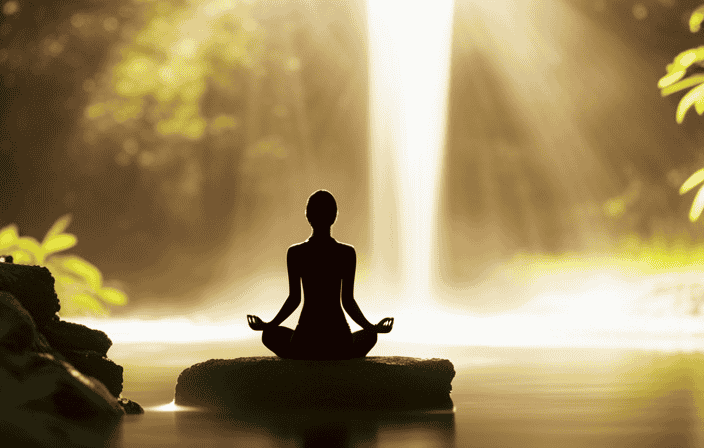While some might consider music simply as entertainment, its real strength is in its capacity to act as a portal for spiritual change.
Music has long been recognized as a tool for personal growth and healing, with its ability to evoke deep emotions and connect individuals to their inner selves.
In this article, we will explore the benefits of music therapy, the incorporation of music into spiritual practice, and the significance of music in various spiritual traditions.
By delving into the healing properties and transformative nature of music, we can better understand its role in promoting love, gratitude, and spiritual connection.
Key Takeaways
- Incorporating music into spiritual practice can enhance the overall experience and promote feelings of love, peace, and gratitude.
- Music therapy can be used as an adjunct treatment for anxiety, depression, and stress-related disorders, with music having healing properties.
- Meditating with music can help focus and relax the mind, increasing sensory perception and stimulating emotional centers.
- Music has been used in ancient traditions as a tool for connecting with higher realms, enhancing spiritual connection and communication.
Benefits of Music Therapy
Music therapy is an effective adjunct treatment for anxiety, depression, and stress-related disorders, and it has been used medicinally in various cultures for centuries. Chinese physicians even used musical preferences for diagnosis.
Music therapy treats each person vibrationally, recognizing that music has healing properties. It works by connecting with the body and mind on a deep level, using the power of sound and rhythm to promote relaxation and emotional release. The vibrations of music can help to soothe the nervous system, reduce muscle tension, and alleviate symptoms of anxiety and depression.
Additionally, music therapy can enhance self-expression and communication, allowing individuals to explore and process their emotions in a safe and supportive environment.
Overall, music therapy holds immense potential as a tool for promoting emotional well-being and spiritual transformation.
Incorporating Music into Practice
Incorporating melodies into my spiritual practice enhances my connection to the divine and promotes a sense of peace and gratitude. Music has a profound impact on my spiritual journey, allowing me to manifest intentions and connect with my inner self on a deeper level. It creates a sacred space for meditation and reflection, enabling me to enter a state of tranquility and mindfulness.
To better understand the significance of incorporating music into my spiritual practice, I have created a table below that highlights the various benefits and effects:
| Benefits of Incorporating Music into Spiritual Practice |
|---|
| Enhances spiritual practice |
| Promotes feelings of love, peace, and gratitude |
| Manifests intentions and connects to inner self |
| Creates a sacred space for meditation and reflection |
| Chanting mantras or singing hymns deepens spirituality |
By selecting appropriate tracks without lyrics or distracting elements, I am able to fully immerse myself in the experience. Different genres resonate differently with my spiritual practice, allowing me to explore different aspects of my spirituality. Music increases my sensory perception, stimulates emotional centers, and facilitates creativity and deep healing.
Incorporating music into my spiritual practice aligns with ancient traditions where music was used as an essential tool in ceremonies and rituals. It connects me with higher realms and spiritual experiences, enhancing my spiritual connection and communication. Music has the power to convey spiritual messages and guidance, and its lyrics and emotions provide insights for my spiritual journey. Letting go while immersing myself in music leads to spiritual growth and transformation.
In conclusion, incorporating music into my spiritual practice is a gateway to spiritual transformation. It enhances my connection to the divine, promotes a sense of peace and gratitude, and facilitates deep healing and self-discovery.
Meditating with Music
Meditating with soothing melodies helps me focus and relax my mind, allowing me to enter a state of deep tranquility and mindfulness. The power of music in spiritual practice is undeniable, and incorporating it into my meditation sessions has been a transformative experience. Here are three ways in which music enhances my meditative practice:
-
Music helps me increase sensory perception and stimulates emotional centers. As I listen to the gentle melodies, I become more aware of my surroundings and the sensations in my body. This heightened awareness allows me to fully immerse myself in the present moment.
-
Music facilitates creativity and deep healing. The melodies and rhythms evoke emotions and memories, providing a channel for self-expression and exploration. This creative process allows me to release any stagnant energy or emotions, promoting a sense of inner healing and growth.
-
Different genres of music resonate differently with my spiritual practice. Some days, I might choose soft instrumental tracks to create a calm and peaceful atmosphere. Other times, I might opt for chants or mantras to deepen my connection to the divine. The choice of music is personal and intuitive, reflecting my current spiritual needs.
Incorporating music into my meditative practice has truly opened up a gateway to spiritual transformation. It allows me to go beyond the boundaries of my physical existence and connect with a deeper, more profound aspect of myself.
Music in Spiritual Traditions
Exploring the rich tapestry of spiritual traditions, I have discovered how different cultures have utilized the power of sacred songs and chants for connecting with higher realms and nurturing their spiritual experiences.
Music has been an essential tool in ceremonies and rituals across various spiritual traditions. Ancient Egyptians chanted mantras and performed dances to invoke spiritual energies. Tribes from different parts of the world have used sacred songs to seek blessings from spirits and establish a deeper connection with the divine.
The use of music in spiritual practices is not limited to specific cultures or regions; it is a universal language that transcends boundaries. Music enhances spiritual connection and communication, allowing individuals to tap into higher realms and experience spiritual transformation.
It is through the melodic vibrations and harmonious tones that one can truly immerse themselves in the spiritual journey and unlock the profound wisdom and insights that lie within.
Understanding the Significance
I have come to recognize the profound significance of songs that get stuck in my head. They often carry spiritual messages or guidance that can lead to personal growth and development.
These songs serve as a form of communication from the spiritual realm. They offer insights and wisdom that can aid in my spiritual journey.
The lyrics and emotions of these songs provide valuable clues and interpretations. They allow me to delve deeper into my inner self and understand my spiritual path.
By paying attention to these songs and reflecting upon their meanings, I am able to let go of any barriers or limitations that may be hindering my spiritual growth.
This process of letting go leads to transformation and allows me to align myself with higher spiritual realms.
As I embrace the significance of these songs, I embark on a journey of self-discovery and spiritual expansion.
Promoting Love and Gratitude
Promoting love and gratitude in my spiritual practice allows me to cultivate a deeper connection with the divine.
When I incorporate music into my spiritual practice, it enhances my ability to feel love, peace, and gratitude. The melodies and rhythms of the music resonate within me, creating a sacred space for meditation and reflection.
As I chant mantras or sing hymns, I can feel my spirituality deepening, and I am able to manifest my intentions and connect with my inner self.
Music therapy, which has been used medicinally for centuries, treats each person vibrationally and has healing properties. When I meditate with music, it helps me focus and relax my mind, increasing my sensory perception and stimulating my emotional centers.
Through music, I am able to facilitate creativity and experience deep healing, allowing for spiritual transformation.
Healing Properties of Music
When incorporating music into my spiritual practice, I can experience the healing properties of melodies and rhythms, allowing for deep emotional and physical healing.
Music has long been recognized for its therapeutic effects, and its ability to promote healing is evident across various cultures and traditions.
The vibrations and frequencies produced by music have a profound impact on the body and mind, facilitating a state of relaxation and promoting the release of stress and tension.
Through the power of music, I can tap into my inner self and connect with my emotions on a deeper level, allowing for the expression and release of pent-up feelings.
This process of emotional catharsis can lead to a sense of relief and rejuvenation, promoting overall well-being and spiritual growth.
Moreover, music has the ability to stimulate the production of endorphins, which are natural painkillers, further enhancing the healing process.
By immersing myself in the harmonious sounds and rhythms of music, I can experience a profound sense of peace, tranquility, and restoration.
Connecting with Higher Realms
In exploring the healing properties of music, we have witnessed its profound impact on our well-being and emotional state. Now, let us delve deeper into the transformative power of music as a gateway to connecting with higher realms.
When we engage in spiritual practice, we seek to transcend the physical and tap into the spiritual aspects of our existence. Music has long been recognized as a powerful tool in this pursuit. Across cultures and traditions, music has been used as a means to connect with the divine, to access higher states of consciousness, and to communicate with spiritual beings.
Through the vibrations and frequencies of music, we are able to align ourselves with the energetic realms beyond our physical reality. It serves as a conduit, allowing us to bridge the gap between the material and the spiritual. Whether through chanting, hymns, or instrumental compositions, music has the ability to transport us to a higher plane of existence, where we can experience profound spiritual connection and receive guidance and inspiration from the divine.
In this way, music becomes an integral part of our spiritual journey, helping us to expand our awareness, deepen our connection to the spiritual realm, and facilitate our transformation on a profound level. By harnessing the power of music, we open ourselves up to a world of spiritual possibilities, where we can experience the transcendence of our physical limitations and embrace the vastness of our spiritual selves.
Frequently Asked Questions
How can music be used as a tool for spiritual transformation?
Music can be used as a powerful tool for spiritual transformation by enhancing spiritual practice, promoting feelings of love and gratitude, creating a sacred space for meditation, and deepening spirituality through chanting mantras or singing hymns. It also serves as an adjunct treatment for anxiety, depression, and stress-related disorders, with its healing properties recognized by various cultures. Meditating with music helps focus and relax the mind, while different genres resonate differently with spiritual practice. Music has been used in ancient traditions for blessings, ceremonies, and connecting with higher realms. It holds a spiritual significance as a sign of guidance and transformation, providing insights for the spiritual journey and facilitating growth through letting go.
What are some examples of specific genres of music that resonate well with spiritual practice?
One example of a genre of music that resonates well with spiritual practice is Gregorian chant. Its slow, melodic nature and Latin lyrics create a meditative atmosphere, allowing for deep reflection and connection to the divine.
Can music therapy be used as a standalone treatment for anxiety and depression?
Music therapy cannot be used as a standalone treatment for anxiety and depression. While it can be an adjunct treatment, it is important to incorporate other forms of therapy, such as medication and counseling, for a comprehensive approach to mental health.
What are some practical tips for incorporating music into meditation and reflection?
Practical tips for incorporating music into meditation and reflection include selecting appropriate tracks without lyrics or distracting elements, exploring different genres that resonate with your spiritual practice, and allowing the music to increase sensory perception and stimulate emotional centers for deep healing.
How can music help individuals deepen their spiritual connection and communication?
Music helps individuals deepen their spiritual connection and communication by enhancing their spiritual practice, promoting feelings of love and gratitude, manifesting intentions, creating a sacred space for meditation, and deepening their spirituality through chanting mantras or singing hymns.









